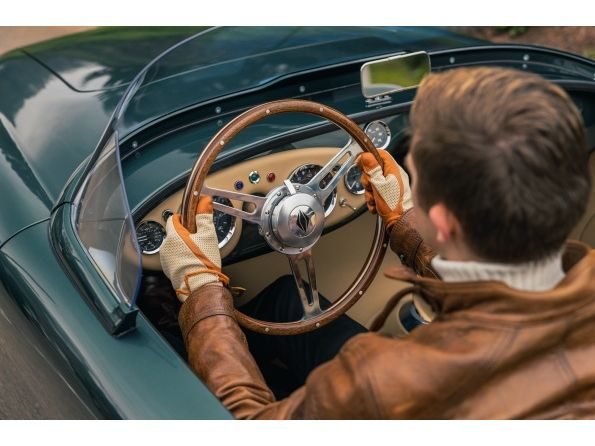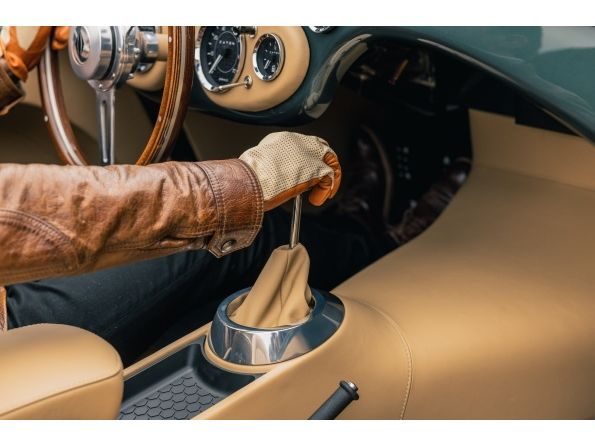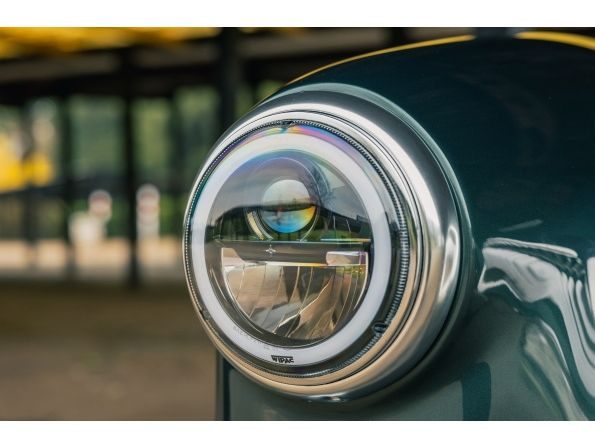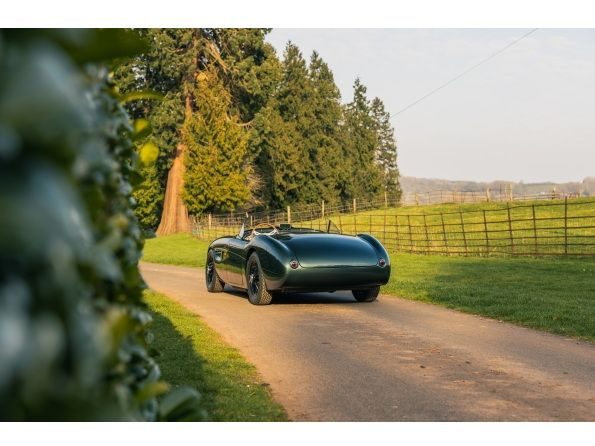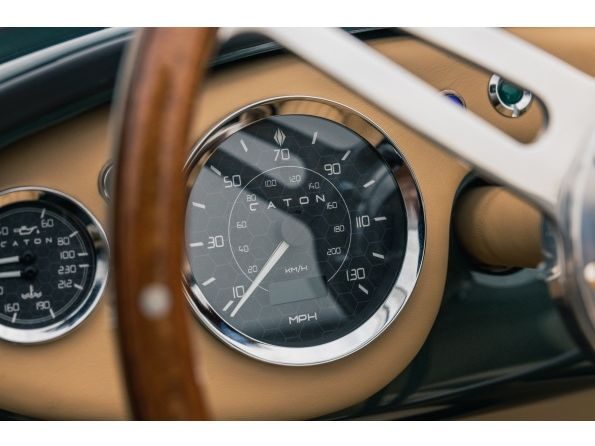Categories more
- Adventures (17)
- Arts / Collectables (15)
- Automotive (37)
- Aviation (11)
- Bath, Body, & Health (77)
- Children (6)
- Cigars / Spirits (32)
- Cuisine (16)
- Design/Architecture (22)
- Electronics (13)
- Entertainment (4)
- Event Planning (5)
- Fashion (46)
- Finance (9)
- Gifts / Misc (6)
- Home Decor (45)
- Jewelry (41)
- Pets (3)
- Philanthropy (1)
- Real Estate (16)
- Services (23)
- Sports / Golf (14)
- Vacation / Travel (60)
- Watches / Pens (15)
- Wines / Vines (24)
- Yachting / Boating (17)
Published
04/29/2022 by CatonAll-new luxury British brand Caton reveals its first creation: an ultra-exclusive reincarnation of the iconic Austin-Healey 100 sports car. Featuring a unique combination of OEM-grade design and engineering with traditional craftsmanship techniques, Healey by Caton brings the revered sports car up to date.
Featuring precision visual and performance enhancements, wholly in keeping with the ethos of the original car, Healey by Caton is a true driver’s car: an immersive, intoxicating and highly emotional experience. It will be extremely rare too, with a very limited run set of 25 cars to be hand-built in Coventry. The Healey by Caton will make its global public debut at the upcoming Salon Privé London event from 21-23 April, held at Royal Hospital Chelsea. The team and car will announce a full events plan, centred around the UK for 2022, including attending and presenting at the upcoming, sold-out Bicester Scramble! event on Sunday 24 April.
Caton occupies a unique position in the market, forging new products from an exceptional skillset and state-of-the-art technology. With unmatched resources that enable it to offer a completely new luxury proposition, its first offering is in bespoke vehicles. However, Caton’s team vows to create and manufacture products that align with luxury, British craftsmanship in the foreseeable future, and not just cars. The brand brings an exceptional harmony of experience, passion, OEM-level technology and craftsmanship to bare, focusing exclusively on the sympathetic enhancement and evolution of cherished products for the modern age, the first of which is a coachbuilt vehicle, the Healey by Caton.
Taking a forensic yet sympathetic approach, Caton’s designers have introduced a subtle smoothness to the Healey’s instantly recognisable lines, gently amplifying the visual dynamism while fully respecting the engineering and design principles of the original car’s creator, Donald Healey.
Inside, the cockpit is totally new with a focus on the very best in contemporary and period materials. Thanks to a redesign of the transmission tunnel and new five-speed manual gearbox, there has been a transformation in cabin space. As a result, Healey by Caton is a highly useable sports car, offering all drivers the feeling of a classic but with true comfort. The finishing touch is a high-performance engine and finely-honed suspension, all of which combines to elevate driving pleasure to another level.
An icon from the Midlands, modernised
Caton’s team are enormous advocates of the Healey. In 1952, Donald Healey built the first Healey 100 prototype at his company’s workshops in Warwick, located ten miles south of Caton’s Coventry HQ. Healey took his fledgling, four-cylinder-engine two-seater roadster to that year's London Earls Court Motor Show. where he famously forged an alliance with Austin boss Leonard Lord to build it as the Austin-Healey 100.
Six iterations of the car were produced between 1953 and 1958, with the four-cylinder engine eventually replaced by a six-cylinder unit. Donald Healey was known to have favoured the four-cylinder engine, which is lighter and lends itself to performance upgrades more readily than the six-cylinder. With these reasons in mind, Caton chose the original four-cylinder 100 ‘BN1’ model as its foundation and inspiration.
Tim Strafford, CEO of Caton’s strategic vehicle building partner, Envisage Group, said: “Caton will stand for the best in British coachbuilding, and is the vision of our [Envisage Group’s] investors. We decided that the first product by Caton had to be creative, stand-out in the marketplace, appeal to a global audience, and it was a natural step that we chose to put our Caton mark on a Healey 100.”
For the project, Caton's designers and engineers have been able to call on strategic partner Envisage Group’s formidable resource at every step. And they have also deployed traditional handcrafting skills and tools, which would have been used by those building the Healey 100 in the Fifties.
Strafford continued: “The Healey by Caton is a car for those who appreciate beautiful objects and exquisite works of art. It is also for those who love the smell of petrol and the sound of a high-performance engine running on carburettors. The Healey by Caton deliberately exposes its occupants to the elements and places them right at the heart of a unique, highly visceral, life-affirming driving experience - none more so than the sound of the side-exit exhaust below the driver’s ear.
"With all mechanical components reconfigured as new, the Healey by Caton frees owners from any reservations they might have over purchasing a classic car. It delivers peace of mind, alluring beauty and breath-taking performance.”
Exterior design and body
Caton's ethos is to take loved and cherished cars and objects from the past and improve upon them using new materials and ultra-precise manufacturing processes. This approach, which goes beyond merely that of reimagining, is one of purification, modernisation, and ultimately reincarnation, and is enthrallingly embodied in the Healey by Caton.
The Healey by Caton design has been directed by Darryl Scriven, who explains: “Donald Healey got so much right when he designed the car originally. We wanted to pay homage to the original vehicle while making it more comfortable to live with, more fun to drive and even more dynamic and beautiful to look at.”
Scriven and his team sympathetically redesigned the front grille, enhancing the sense of depth and proportion with a meticulousness that only OEM-level design tools and systems can deliver to denote the additional performance the car is endowed with. The grille, which is a piece of jewellery on the front of the car, is a piece of art with each slat individually created, pieced together to create a floating look, behind the Caton hexagonal trim, a shape that flows delicately but deliberately throughout the vehicle.
The car’s original quarter-length bumpers have been removed and the front remodelled to create a smoother, cleaner look. The front valance has also been elongated to hide the front of the chassis’ legs, creating a more premium feel. Subtle remodelling of the headlights has achieved a similar effect and created superior illumination with the integration of LED and daylight running lamps.
The execution of a cleaner, smoother look has been applied across the entire body, with all seams and beading removed. This is evident in the new front aluminium fenders, which feature a more clamshell-like construction. Despite being built on an English Wheel, using traditional methods, they are entirely free of the beading that ran through the centre of the original items. A new air vent and a finisher have been integrated into the flanks, visually amplifying the diving line that runs along the side of the car.
Caton has also added additional detail to the car’s rear fender. Scriven reveals why: “We've brought in a little more substance, which gives a bit more volume and creates a greater sense of dynamism. I haven’t worked with any other company or coachbuilders that can create a car like this, from scratch. A key example is the volume on the bonnet. We subtly re-sculpted, by hand on an English Wheel, to create a smoother line that flows down the front of the car, to replace the flatter bonnet of the original, foundation car.”
For the most part, though, Caton has refined, rather than added to the Healey's body. The rear bumpers are gone, as are the external boot hinges, replaced with new internal hinges running on modern gas struts. The boot handle is deleted too, and the lid is now opened by an internal release mechanism, run by a new, modern Caton key.
“To remain true to the car's D.N.A., we asked ourselves ‘What would Healey have done when building a car in the Fifties if they had the tools and manufacturing techniques that we are in the unique position to have at our disposal today?’” continued Scriven.
The OEM-level technology he refers to allowed Caton to capture a complete 3D scan of the car. A Computer Numerical Control (CNC) machine enabled the fabricators to work to tolerances of just .2mm, creating ultra-perfect panel gaps that add to the beautification of the bodyshell. Yet the team also deployed technology that would have been entirely familiar to those building the car in period, such as an English Wheel, which was used to hand roll the aluminium panels.
Following a dry build to ensure absolute accuracy in final assembly, the body spends two weeks in Caton’s paint shop. It is primed, equipped with an OEM-standard anti-corrosion protection layer, and then painted. No level of detail is spared, with paint also applied to the boot's interior. The car retains its original badging, with the subtle addition of the Caton brand logo to the front fenders. Period-style, lightweight 72-spoke Borrani black aluminium alloy wheels with black spinners are fitted and shod with period-correct but modern manufactured, off-the-shelf Michelin tyres.
Interior
Caton’s redesign of the Healey’s cabin wholly maintains the essence of the original, while creating significantly more space. This has been achieved primarily through the redesign and narrowing of the transmission tunnel, made possible by introducing a new five-speed manual gearbox.
The standard car used a three-speed gearbox originally designed for column-shift actuation, with the gear lever positioned offset on the left-hand side of the transmission tunnel. Now, the gear lever sits in a central position on the top of the transmission tunnel, transforming both the aesthetic appeal of the cabin and driving pleasure. Original Healey 100s were designed and built for a shorter population meaning many of today’s drivers may struggle to comfortably enjoy the experience. Thanks to restyling the rear and a different pedal box fitted, it’s reported that in development testing a 6ft tall driver needed to move the seat forwards towards the cabin whereas they struggled to fit in an original Healey 100/4.
Healey by Caton Project Manager David Moore explains: “We chose to replace the existing Healey gearbox with its bulky transmission tunnel and offset gear-lever, with a new five-speed manual transmission for the aforementioned reasons of enhancing space and practicality within the cabin, but also, of course, to transform the driving experience.
“The new gearbox is provided by world-leading transmission experts. The highly proven unit is exceptionally durable, and its five-speed configuration endows the car with a much more comfortable long-distance touring ability. But it's over a hairpin strewn mountain pass where drivers will really appreciate the difference. Combined with a custom hydraulic concentric clutch release bearing, the gearbox provides a rapid and immensely satisfying gearchange feel.”
The Healey by Caton has been modernised with the fitment of a racing car style pedal box to further increase the legroom available to the driver. The car's roof and tonneau cover have also been removed, along with the heater. There is no infotainment system to detract from the driving experience, although two USB ports are provided to enable charging of electronic devices if required. The door cards and pockets have also been maximised to fit a water bottle and other items.
Further extolling the values upon which the Healey by Caton has been built, Scriven says: “We wanted to accentuate the visceral feel of the driving experience and let the driver and passenger truly relish the sound of the engine and the sensations of the open road. The side-exit exhaust has been meticulously positioned close to the driver’s ear, for instance.
Yet, we also wanted to ensure that the occupants could talk to each other and be comfortable on long journeys. The Healey by Caton is a car that you might drive to Goodwood for the day, but it’s also a car you could drive along a beautiful coastal road in Monaco. We’ve extended the height of the front windscreen slightly to reduce buffeting and added strengthening elements to the seat frames, giving the period-style seats more support and greater comfort.”
OEM-standard shrink-optimised leather was chosen for the dashboard and redesigned door panels for the superior tight fit and finish and greater durability it provides. However, the material was deliberately shunned for the car’s seats for the very simple but very important reason it does not produce any smell.
“Shrink-optimised leather doesn’t create that wonderful aroma you get from natural leather,” continues Scriven. "That's why, after consultation with our in-house trim and fabrics studio, we elected to upholster the seats in premium Bridge of Weir hide, which enriches the cabin with the fragrance of leather, and will develop a beautiful patina over time. That's part of the Healey by Caton’s authentic appeal, which will only get better and better the more the car is driven.”
Drivetrain
The car’s beating heart is a 185 bhp 195 ft/lbs of torque 2954cc four-cylinder engine, endowed with performance to take the car well beyond the 100mph top speed it was named for. Based on an original Austin-Healey block, the engine is completely stripped down, fully lightened, balanced, and then refurbished to zero miles. It is further enhanced with a full steel crank shaft, upgraded bearing shells, high compression pistons, a race camshaft with more aggressive lobes and roller rockers. Larger Twin H8 carburettors and gas flow inlets provide excellent throttle response. A race side-exit exhaust system adds further to the car’s considerable aural appeal.
The engine, and most of the car's mechanical components, are the work of the world’s leading Healey specialists J.M.E. Healeys (J.M.E.), who has strong historical links with the original Healey company. Jonathan Everard, who founded J.M.E., and his father Harold, worked for the Donald Healey Motor Company in Warwick. Today, the company is run by Jonathan’s sons, Chris and Dan and is based in The Cape Works in Warwick, the original home of the Healey company.
Tim Strafford explains the rationale behind Caton’s creation of a collaborative partnership with J.M.E.: “Caton’s mission is to create products in automotive and beyond of the highest possible calibre of design, quality and appeal. Caton is entirely transparent on how it achieves this. When creating Caton’s brand values, we asked ourselves: ‘Where is Caton world-class? And where could it add value for its customers by forming strategic partnerships to bring additional skills on board?’ When it comes to the Austin-Healey brand, there is no one more experienced or knowledgeable than J.M.E.”
Thus, Caton elected to use J.M.E.'s ultimate Healey 100 BN1 Cape Works specification as the basis for the Healey by Caton project. The car benefits from a new chassis, strengthened and modified at known weak points - including the addition of new front and rear bulkheads - identified from J.M.E.’s decades of experience in restoring, servicing, and rallying Healeys. It provides an exceptional, robustly proven building block for the Healey by Caton. Nevertheless, Caton wanted to expand the car's considerable performance parameters and bolster its unique driving appeal yet further.
Strengthened driveshafts transfer the formidable performance to the road. In keeping with the Healey by Caton’s pure, driver-focussed appeal, there are no electronic traction or stability controls to dilute the driving experience. Exemplary stopping power is provided by four-pot alloy callipers with vented front discs at the front, with discs and three-pot alloy callipers fitted at the rear. No ABS system is fitted in keeping with the purist driving feel.
Suspension and steering
Decades of international rally success testify to the inherent strength and durability of the Healey's original suspension configuration. The system has been further honed by J.M.E. while retaining the original rear semi-elliptic leaf spring set-up. The Healey by Caton features a double-wishbone and adjustable coil spring configuration at the front, with a lever arm damper system and the car's proven leaf spring system at the rear. Custom fabricated and fully rose-jointed roll bars are also fitted front and back. The unassisted steering system delivers exceptional levels of feel and feedback.
Customer-first values
With production of the Healey by Caton limited to 25 examples, the company will liaise with customers on a highly personal, one-to-one basis, as frequently as each requires. Each customer can be assured of the highest possible level of service. They will be welcome to visit Caton's Coventry HQ on a regular basis, to tour the company's design studios, trim and colour suite and paint facilities, and immerse themselves in every stage of their car’s development progress.
The customer has the ability to add completely bespoke and personal touches to any of Caton’s products, whether that be the car’s exterior paint finish through creating any colour imaginable or choosing from the extensive array of materials available in the on-site colour and trim suite for the car's interior.
Tim Strafford vows: “It will be our privilege to collaborate with Caton’s customers to specify their car to their exact requirements, whether they choose to visit in person or liaise from anywhere across the globe. No two examples of the Healey by Caton will be the same, but each will be of exceptional beauty and built to the highest possible OEM levels of quality. Each will represent a true reincarnation of the iconic Austin-Healey 100 sports car utterly fitting for the modern age. Our aim is to deliver an unrivalled, immersive, intoxicating and highly emotional driving experience.”
Hand-built production of the Healey by Caton will commence in Q2 2022. It will make its global public debut at Salon Privé London from 21 April to 23 April inclusive and attend the upcoming Bicester Heritage Scramble! on 24 April. Customers are urged to sign up to Caton’s mailing list via www.caton.uk, where a range of events will be announced, and news will be distributed. Caton’s team plans to attend many events - from smaller breakfast clubs to larger, public events, in 2022 and beyond, starting from the UK and travelling further afield to global stages from 2023.















